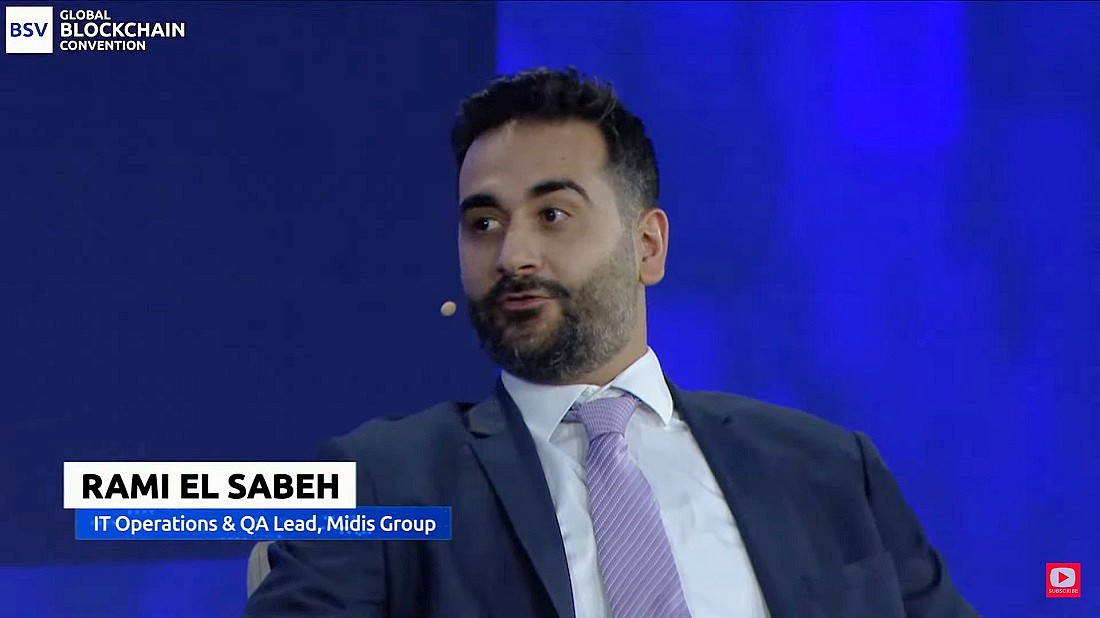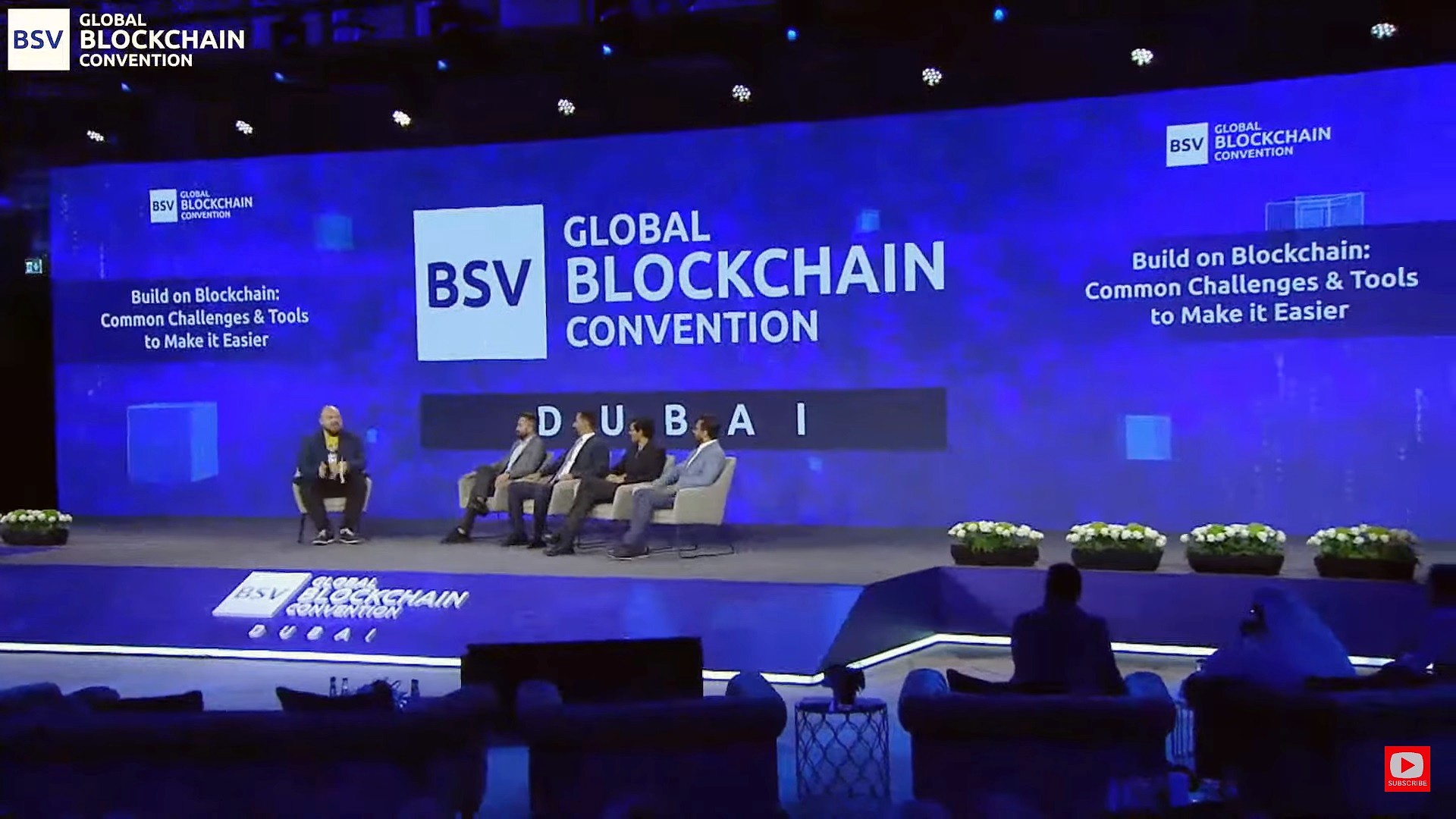Rami El Sabeh interviewed about Blockchain and his participation at the BSV Global Blockchain convention
Rami has developed a keen interest in the Blockchain and was one of 100 experts invited to speak at the major convention

Rami El Sabeh is a key part of the team at Midis Group HQ in Lebanon, keeping IT wheels going round for the whole Group. One of the reasons for the distinctive business approach that marks out Midis Group from the competition is that they encourage individual innovation and thinking at every level. Rami has excelled at this with his research into Blockchain technologies and how they might fit into our everyday business and possibly one day become a major growth factor. In this interview, we asked Rami to tell us more about how he came to explore this exciting technology, and also more about the global context and prospects for Blockchain.
Q: Can you give us a brief overview of your experience and work with Midis? When did you start at the Group? What did you do before this, and what did you study at college?
I currently occupy the position of IT Operation and QA Lead within Midis Group, where my team’s primary objective is to provide Midis’ 170 affiliates quality tech services in order to expand their collaboration, compliance and security through the use of Midis Group IT-managed services. I started with the group in March 2018; my previous experience was as a senior technology engineer with one of the biggest construction enterprises, CCC, for almost nine years. I was executing and managing their IT business solutions projects in the EU, Central Asia, Africa, and Australia. Before that, I was at the City University of Seattle working as a tech engineer supporting the University IT services and completed my bachelor’s degree in computing and telecommunication. I continued earning tech qualifications with certificates in Microsoft, Virtualization, ITIL, and Blockchain. I’m currently enrolled in the MIT learning program in Blockchain Technologies: Business Innovations and Applications.
Q: What was the trigger that brought you into an interest in the Blockchain? Was it a work project or private interest?
I was always a technology enthusiast; initially, my first contact with Blockchain was around 2012 when I first heard about Bitcoin. Although I didn’t understand the logic, I started following the market of Cryptocurrency speculation, but then I realized there is much more to the technology than Cryptocurrencies. In 2017, I started my own research and enrolled in learning programs in Blockchain and fell down a rabbit hole researching how this technology will influence the future of our digital economy. My focus then shifted from how to make quick money to how this technology can positively impact societies and industries.
Q: Can you give us a quick description of Blockchain, how people perceive it nowadays and what benefits it might bring to today’s business and economy?
Blockchain is a ledger (think of it as an Excel sheet/Database) that keeps records of digital events and adds a time stamp, recording when each digital event happened. A typical digital event might be a payment, for example. The records are grouped together into data blocks that get distributed to Nodes (servers) without being bound to a single server or an entity.
Each block has an identifier, like a fingerprint, based on the records within the data block. Once a new data block is generated through a process called mining, the block links itself to the previous block and uses the previous block’s identifier as the main record within it, creating a chain of blocks linked together that makes all the records in the data blocks immutable to any change. Simple right?
In 2008 the Bitcoin Whitepaper was released by an individual or entity who was given the pseudonym Satoshi Nakamoto, introducing Bitcoin/Blockchain technology to the world. Since then, individuals and business entities have used the Open-Source code of how the system works and started experimenting and creating thousands of different blockchains with different protocols. It’s that diversity that created the current, sometimes volatile, ‘Crypto Currency’ scene. It’s that space that is full of financial scams and speculations, where people buy a specific token/digital currency hoping for an increase in demand to be able to sell it at a higher price.
Unfortunately, that is far from what this technology was created for and its potential capabilities. In fact, Blockchain tackles problems in digital trust by securing important data through the development of a consensus mechanism in a public network where data is timestamped, de-centralized, and can be encrypted without any tampering. It offers new ways of dealing with data specifically for authentication and authorization. Smart contracts can be created to define specific agreements which enforce obligations. This could play a big role in many industries, from the public sector to supply chain, manufacturing, commerce and many more where trust is key to business growth.

Q: Can you tell us a bit about the BSV convention and your participation – how did you get involved?
During my exploration of this topic, I realized the real value of Blockchain is that it can handle a lot of transactions per second, with low fees, and still maintain network security through the original Bitcoin protocol. That is when I discovered BSV Blockchain which was superior to most Blockchain protocols. I have connected myself to their ecosystem and met a lot of individuals, from engineers to developers and entrepreneurs, all focused on the same vision of how to maintain an Enterprise blockchain best suited for the requirements of the new digital economy.
The BSV Global Blockchain Convention was the third convention to take place after initial events in Zurich and New York. Being a member of the Bitcoin Association and through my experience in technology and Blockchain, I was invited as a speaker in a panel titled ‘How to Build on Blockchain: Common Challenges.’ The convention was an amazing three day experience, meeting with entrepreneurs and developers working on enterprise solutions, to learn about the evolution of the Blockchain space.
The convention tackled multiple subjects; Enterprise applications, Government initiatives, Future of Digital assets, Digital Transformation, Future of Finance, Gaming applications, Metaverse, CBDCs, IoT, Supply Chain Solutions, Entertainment, Sports, Web3.0, IPv6, Law & Regulatory compliance, Tokenizing Assets, Smart Contracts, ESG Compliance, Cyber Security and more.
Q: What developments do you think will make blockchain really become accepted by the business community?
Personally, I believe that blockchain will solve a lot of major issues in the business community. Specifically, in cybersecurity, we see industries are spending huge sums to protect their networks and systems. In fact, the whole economy is spending billions of dollars, and these investments are always with no returns – it is being spent by businesses to protect their data, whether it is on-premises or in the cloud.
What Blockchain provides is a new way of storing data and maintaining the highest security through traceability within its core infrastructure – without the need to trust third parties – and with much lower fees. This technology is still evolving and scaling, and ultimately it will reach a point where it will embed itself in the fabric of the Internet, providing a secure way for the exchange of digital information from peer to peer by minimizing intermediaries.